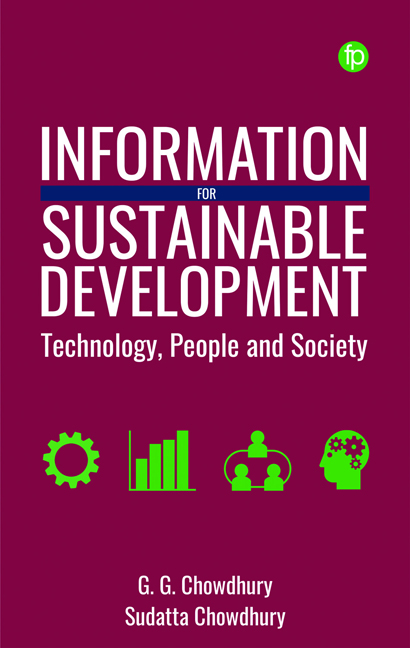Book contents
- Frontmatter
- Dedication
- Contents
- Figures
- Tables
- About the Authors
- Introduction
- 1 Data, Information, People and Society
- 2 Information and the Sustainable Development Goals
- 3 Sustainable Development Goals: Targets and Indicators
- 4 Data, Information and Progress in SDGs
- 5 Capacity, Co-operation and Sharing of Data for SDGs
- 6 People and the SDGs: the Digital Divide
- 7 People and the SDGs: Access to Data and Digital Skills
- 8 Information Skills and the SDGs in Everyday Life
- 9 Information, Education and Sustainable Development
- 10 Research and Development Around the SDGs
- 11 Information Education, Research and Professional Developments Around SDGs
- References
- Index
2 - Information and the Sustainable Development Goals
Published online by Cambridge University Press: 13 April 2024
- Frontmatter
- Dedication
- Contents
- Figures
- Tables
- About the Authors
- Introduction
- 1 Data, Information, People and Society
- 2 Information and the Sustainable Development Goals
- 3 Sustainable Development Goals: Targets and Indicators
- 4 Data, Information and Progress in SDGs
- 5 Capacity, Co-operation and Sharing of Data for SDGs
- 6 People and the SDGs: the Digital Divide
- 7 People and the SDGs: Access to Data and Digital Skills
- 8 Information Skills and the SDGs in Everyday Life
- 9 Information, Education and Sustainable Development
- 10 Research and Development Around the SDGs
- 11 Information Education, Research and Professional Developments Around SDGs
- References
- Index
Summary
Introduction
As mentioned in Chapter 1, the 17 Sustainable Development Goals (SDGs) were adopted in the United Nations Resolution (A/RES/70/1) in 2015. However, the terms ‘sustainability’ and ‘sustainable development’ have been in existence for quite some time, and have become key issues of discussions around global development. A report published by the World Commission on Environment and Development in 1987, called Our Common Future, which is also known as the Brundtland Report, provided the ‘classic’ definition of sustainable development as:
development which meets the needs of the present without compromising the ability of future generations to meet their own needs
(United Nations, 1987).The Environmental Protection Agency (EPA) in the USA argues that sustainability creates and maintains the conditions under which humans and nature can exist in productive harmony, that permit fulfilling the social, economic, and ecological requirements of present and future generations (EPA, 2010).
These definitions of sustainability focus primarily on the environmental sustainability. However, there are two more dimensions, economic sustainability and social sustainability; the three together are often called the three pillars of sustainability. They are interrelated and interdependent. To achieve sustainable development in any area, there is a need for an integrated approach to these three dimensions of sustainable development (DEFRA, 2009). Thus, sustainable development calls for a convergence between the three pillars of economic development, social equity, and environmental protection (Drexhage and Murphy, 2010).
Appropriate integration of economic, environmental, and social development activities to achieve the SDGs has remained a mission for the United Nations. A number of topics and issues related to sustainable development have been identified by the United Nations Division for Sustainable Development (UN DSD), some of which are social and economic while others are related to environment or natural resource management. The United Nations Conference on Sustainable Development (UNCSD) organised a conference on Sustainable Development – Rio+20 – that took place in Rio de Janeiro, Brazil, on 20–22 June 2012 (United Nations, 2013b). The objective of this conference was to take stock of the 20 years of actions at all levels to promote sustainable development, and to discuss the future and the way forward.
- Type
- Chapter
- Information
- Information for Sustainable DevelopmentTechnology, People and Society, pp. 21 - 40Publisher: FacetPrint publication year: 2024
- 1
- Cited by

